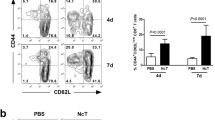Abstract
Two distinct mechanisms seem to function in reducing oocyst output during Eimeria papillata infections in mice. For naive mice, immunity was afforded␣by␣a T-cell-independent gamma-interferon (IFN-γ) response mediated by natural killer (NK) cells. On reinfection, resistance was associated with T-cells and, to a lesser extent, perforin. To determine if antigen presentation with major histocompatibility complex␣(MHC) molecules was required to control oocyst production by NK cells during primary infection or by T-cells during secondary infection, mutant mice that lacked H2-IAβb (Aβb−/−) or β2-microglobulin (β2m−/−) were used. Since MHC molecules are required for the maturation of αβ T-cells, Aβb−/− and β2m−/− mutant mice are also deficient in functional αβ+CD4+ or αβ+CD8+ T-cells, respectively. As compared with wild-type control mice, oocyst output by mutant mice was not significantly affected during primary infection, suggesting that the ability of NK cells to control parasite replication is not dependent on the expression of MHC molecules. On reinfection, differences were observed for mutant mice as compared with controls. Aβb−/− mice were found to be more susceptible than β2m−/− mice, suggesting that the αβ+CD4+ T-cell subset plays a greater role in resistance to reinfection than does the αβ+CD8+ T-cell subset. The mechanism of resistance depends on the immune status of the host and requires the coordinated interaction of both αβ+ T-cell subsets for optimal parasite control during subsequent infections.
Similar content being viewed by others
Author information
Authors and Affiliations
Additional information
Received: 6 August 1997 / Accepted: 24 October 1997
Rights and permissions
About this article
Cite this article
Schito, M., Chobotar, B. & Barta, J. Major histocompatibility complex class I- and II-deficient knock-out mice are resistant to primary but susceptible to secondary Eimeria papillata infections. Parasitol Res 84, 394–398 (1998). https://doi.org/10.1007/s004360050416
Issue Date:
DOI: https://doi.org/10.1007/s004360050416




